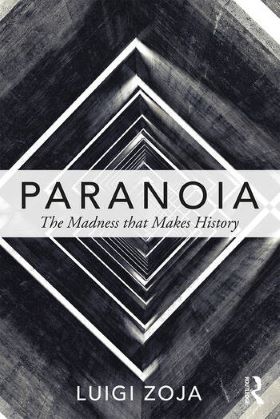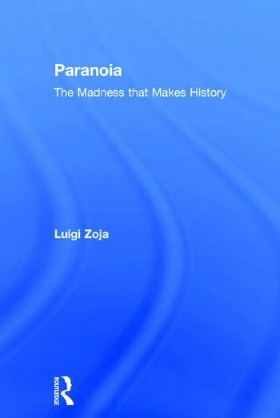Luigi Zoja presents an insightful analysis of the use and misuse of paranoia throughout history and in contemporary society. Zoja combines history with depth psychology, contemporary politics and tragic literature, resulting in a clear and balanced analysis presented with rare clarity. The devastating impact of paranoia on societies is explored in detail.

French version of this book presentation
This book also exists in hardcover edition.
Also read the piece Paranoia or lucid madness centered around this book.
Focusing on the contagious aspects of paranoia and its infectious, self-replicating dynamics, Zoja takes such diverse examples as Ajax and George W. Bush, Cain and the American Holocaust, Hitler, Stalin and Othello to illustrate his argument.
He reconstructs the emblematic arguments that paranoia has promoted in Western history and examines how the power of the modern media and mass communication has affected how it spreads.
Paranoia clearly examines how leaders lose control of their influence, how the collective unconscious acquires an autonomous life and how seductive its effects can be – more so than any political, religious or ideological discourse.
This gripping study will be essential reading for depth and analytical psychologists, and academics and students of history, cultural studies, psychology, classical studies, literary studies, anthropology and sociology.
[Publisher’s presentation]
Table of contents
Introduction: The Madness of Ajax.
1. What is Paranoia?
Individual (clinical) paranoia
Collective (historico-cultural) paranoia
2. The Beginnings: Myth and History
Cain’s envy
The enemy in the Aeneid
The development of the relationship between paranoia and politics
Columbus’s delusion
A voice crying in the wilderness: Brother Antonio Montesinos
The cross and interest
Paranoid law
3. European Nationalism: From cultural renaissance to paranoia
Supervising and mistrusting
The pride and suspicion of nations
The fantasies underlying national law
The imaginary race
The place of the Jews
The Dreyfus Affair
4. Naive Persecutors
The special nature of America
The Black Legend
The empty continent
‘American exceptionalism’
Moby Dick
Founding principles and purity
The separation of the continents and manifest destiny
War of conquest
Spain and Catholicism
The ‘newspaper war’
The United States lands in Asia
The white men’s burden
5. Darkness over Europe
Great is war
Boredom and waiting
Pandarus’ arrow and first casualty
Suspicion grows
Pre-emptive mobilization
Do railway timetables determine the intercontinental dimension
The silence after the gunfire
6. Freud, Keynes and the Bamboozled Man
An American messiah
The fourteen-point dogma
The peace negotiations
Wilson’s self-deceptions
The paranoid atmosphere of the negotiations
The offence
Arrogance
The seeds of new paranoia
7. Siegfried
The illuminating explanation
The legitimization of paranoid nationalist ‘law’
The disappearance of multinational coexistence
The stab in the back
Waiting for more darkness
8. The Granite Foundation and the Hour of Idiocy
Hitler’s revelations
The role of Vienna
Mein Kampf
The apparition of the Jew
Other ‘logical’ steps in Mein Kampf
From theoretician to head of state
Impatience prevails
The choices of death
All obstacles are swept away
‘Who talks about the massacre of Armenians today?’
War at last
Definitive omnipotence
Absurd calculations
Self-burial
The need of an enemy
Delusion to the end
‘Total war’
The final revelation and the abyss
The shadow of Nero
9. The Man of Steel and the Final Product
Stalin: a name with many meanings
Character
Radical mistrust
Allusion and the creation of a self-contained reality
Lenin’s heritage
The gulag
Yakov and Nadya
The diagnosis of paranoia
Some daily habits
Similarities and differences with respect to Hitler
‘Inversion of causes’: the leader’s mind as the origin of society
The massacres
The twentieth-anniversary speech
The ‘denationalizations’ and the ideology that lay behind them
Unpreparedness for war
Counter-attack and the conclusion of the conflict
Suspicion hits the Jews
Stalin’s death
The paradoxes of paranoid totalitarianism
Final questions
10. Fire That Feeds Fire
War crimes and Allied double standards
Collective paranoia and forms of government
Airborne warfare as total war
Poetry and romantic enthusiasm in the air war
The first bombs of the Second World War
The three phases of Allied bombing
Douhet’s predictions are proved wrong
The bombing of Germany
The bombing of Italy
11. Further and Further West
War against an inferior race
War between different races, total war
The erroneous calculation of pre-emptive attack
The impossibility of isolation
Fear of encirclement
A strategy founded on haste
Suspicion and the missed opportunity
Towards the atomic bomb
Contagious fanaticism
The range of options continues to narrow
Hiroshima
The diary of Michihiko Hachiya
The withdrawal of projections and meeting the enemy
More elation
Nagasaki
Rationalizations
Secrecy
Later justifications
The Tokyo Trials
The reawakening of Ajax
Dr Hachiya’s farewell
12. A Plan for the Twenty-first Century?
Paranoia and the new century
The Cold War
The disappearance of the Soviet enemy
The appearance of the Islamic enemy
Paranoia takes the form of a government document
The war caused by suspicion
The responsibility of those who disseminate paranoid messages
The contagiousness of paranoia
The impact on civilian life
13. Inconclusive Thoughts
Understanding evil
Paranoia and psychopathy again
Individual, mass and leader
Three generations of mass media
‘The Giant’
Dictators
Giving back medals
14. Iago’s Whisper
Bibliography.
Translated from Italian by Jonathan Hunt.
Publisher: Routledge – 2017 – 358 pages – ISBN 9781138673663 – 15,6 x 23,39 x 2,06 cm
Hardcover edition

Publisher: Routledge – 2017 – 358 pages – ISBN 9781138673540 – 15,6 x 23,39 x 2,54 cm
 Luigi Zoja
Luigi Zoja
Luigi Zoja is an analytical psychologist in private practice in Milan who lectures internationally. He is a former training analyst of the C.G. Jung Institute Zurich, past president of CIPA (Centro Italiano di Psicologia Analitica) and former president of the IAAP (International Association of Analytical Psychology). He has taught at the University of Insubria and at Beijing Normal University, and his previous books have been published in multiple languages.
Presentation of Luigi Zoja’s books on this site
Learn more
- Paranoia or Lucid Madness—Top Pick by Claire Droin, centered around his book Paranoia: The Madness that Makes History
- The Decline of Sexuality—an interview with Luigi Zoja, conducted by Claire Droin, and centered around his book Le déclin du désir
